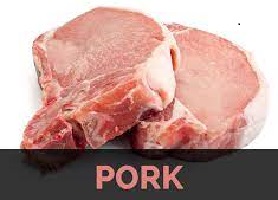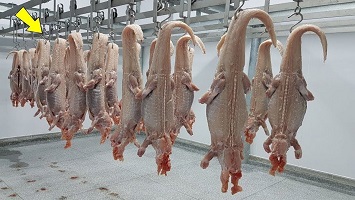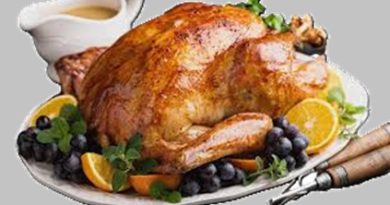Pork Benefits ~ Nutritional Facts and Health Effects
Pork Benefits ~ Nutritional Facts and Health Effects

Table of Contents
Is pork good for you?
Do you want to eat healthily but aren’t sure if pork is a good option? When consumed properly, meat can be a nutrient-dense food for the human body.
Pork is the name given to the meat obtained from a domestic pig and is one of the most popular meats worldwide.
Pork is forbidden in religions such as Islam and Judaism. In Nigeria, it is known as ‘pork meat,’ and it is frequently added to soups, stews, and other delicacies.
Many people find it difficult to consume this meat due to the animal’s perceived filth and excess fat.
Pork, as red meat, has a bad reputation for being unhealthy. It is, however, a good source of certain nutrients and high-quality protein meat.
When consumed in moderation, it can be a beneficial addition to a healthy diet. The nutritional facts and health effects of pork meat are discussed in this article.
Trending Pork Meat Recipes
- Grilled Pork Chops-Nigerian Barbecue Chops
- Grilled Pork Tenderloin Recipe: A Step By Step Guide
- Pork Chops with Pineapple Fried Rice Recipe
- Keto Recipe: Crispy Skin Slow Roast Pork Shoulder
- Lechon – A traditional pork dish from the Philippines
What is Pork?
Pork is the meat obtained from a domestic pig and is one of the most popular meats in the world. It is called as ‘pig meat’ in Nigeria and is regularly added to soups, stews, and other delicacies.
Because of the animal’s apparent dirt and excess fat, many individuals find it difficult to accept this meat. Regardless, pork is one of the most nutrient-dense meats, packed with vitamins and minerals.
It can be a fantastic supplement to a healthy diet when consumed appropriately. Although raw pork is popular, cured or processed pork products such as bacon, ham, and sausages are also popular.
The Pork Recipes
Pork bone broth: this is made with pork bones, water, and seasoning. Pork bone broth benefits our bone and joint health.
The Pork chop: This is made with chops of pork and a bone in the center of the pork meat. Pork chop benefits the body with nutrients like selenium, zinc, and iron which help in losing weight.
The Pork rinds: It is made using fried and puffed pork skin. Pork rinds benefit keto dieters because of their high fat and low carbohydrate.
Pork and beans: This is similar to baked beans but the difference is that pork and beans contain more meat. They benefit the body with fiber and folate which help you stay full for longer and manage weight.
Other easy recipes include:
- Easy Pork Sliders
- Honey Soy Pork Skewers
Nutritional Facts about Pork
Pork is a high-protein food with varying levels of fat. A 3.5-ounce (100-gram) serving of cooked ground pork contains the nutrients listed below.:
- Calories: 297
- Water: 53%
- Protein: 25.7 grams
- Carbs: 0 grams
- Sugar: 0 grams
- Fiber: 0 grams
- Fat: 20.8 grams
Pork contains a lot of:
- Protein
- Niacin
- Vitamins B6 and B12.
- Iron
- Zinc
Protein In Pork Vs Chicken
Pork is undeniably high in protein. However, in comparison with chicken, it is almost the same.
Grilled skinless chicken breast has 128 calories, 2.69 grams of fat, and 26 grams of protein in a 3-ounce serving while 3 ounces of broiled pork tenderloin contains 171 calories, 7 grams of fat, and 25 grams of protein.
Pork Meat Benefit and Side Effects
Pork is nutrient-rich, oily, and high in protein. All parts of pork are beneficial to the body. Below are the benefits of pork meat:
Pork Fat Benefits for Skin ~ Benefits of eating pork
We absorb all of that Vitamin D when we spread pork fat on our skin, which helps to eliminate dark spots and wrinkles, reduce acne, boost collagen synthesis, and reduce inflammation, which is a major feature in illnesses like psoriasis and atopic dermatitis.
Pork Oil Benefits
Pork oil is particularly beneficial for the heart since it contains a lot of monounsaturated fats, which are good for your heart.
Furthermore, it contains good cholesterol, which is important for avoiding the buildup of bad cholesterol, which is the root cause of the majority of cardiac problems.
Pork Belly Benefits
Due to the high-fat content of pork belly; it is a wonderful source of B vitamins as well as other key nutrients including vitamin E, zinc, iron, and copper.
Pork Health Benefits for Hair
Pork tenderloin is high in B vitamins, including folate, B6, and B12. These vitamins are important in the formation of red blood cells, which transport oxygen and nutrition to all cells in the body, including those of the scalp, follicles, and growing hair.
Benefits of Pork During Pregnancy
Pork is a high-quality source of lean protein. Pregnant women can safely consume pork as long as it is not undercooked. Women are more vulnerable to foodborne parasites and diseases during pregnancy.
Health Benefits of Pork Meat
Eating pork is beneficial to the health because vitamins B6 and B12, which are rich in pig, are required for blood cell development and brain function.
The following are the health benefits of pork:
Improves thyroid function: Pork contains a high concentration of selenium, which is essential for thyroid function. Three ounces of pork have around 33 micrograms of selenium.
The thyroid gland is an important hormone gland that regulates metabolism, growth, and development in the human body. Eating foods high in selenium is essential for preventing thyroid illness and maintaining overall health.
Pork helps to maintain muscle mass: A high-protein diet can help you keep your muscle mass. Pork, as a good source of high-quality protein, is ideal for building and maintaining muscle mass.
Muscle function and performance are improved: Muscle function and workout performance can be improved by eating pork meat. They contain a number of nutritious nutrients that are good to your muscles, such as taurine, creatine, glutathione, and beta-alanine, in addition to high-quality protein.
Beta-alanine aids in the formation of carnosine, a chemical essential for muscular activity. As a result, pork is one of the finest foods for bodybuilding.
It provides the body with energy: Pork is high in B vitamins such as thiamine (vitamin B1) and niacin (vitamin B3), which help the body’s cells convert carbohydrates into energy.
Improves brain and immune system function: Zinc, a crucial mineral for a healthy brain and immune system, is abundant in pork flesh.
It is essential for the body’s immune system to function effectively and also plays a role in cell division, cell development, wound healing, and carbohydrate breakdown.
Pork improves bone and teeth health: Pork is high in B vitamins such as thiamine (vitamin B1) and niacin (vitamin B3), which help the body’s cells convert carbohydrates into energy.
Pork is high in collagen: Collagen is responsible for tissue structure, toughness, stiffness, and texture; without it, wrinkles on the skin will form.
Collagen is necessary for the body, and consuming pork increases its concentration, which can improve skin tone, keep skin healthy, and minimize acne.
Potential Side Effects of Pork Meat—–Disadvantages of Pork Meat
There are also some possible health risks associated with eating pork.
Pork could contain Parasites: Parasites are most likely to be found in undercooked or raw pork. Taenia solium, sometimes known as pork tapeworm, is an intestinal parasite that is commonly seen in pigs.
It can occasionally produce cysticercosis, which can lead to epilepsy. They may also harbor parasitic roundworms like Trichinella. As a result, to avoid parasite infection, always thoroughly boil pig.
Pork can be heavy in sodium and saturated fats: both of which should be avoided or reduced in a balanced diet.
13 Problems with Pork
Although there is no specific medical evidence to support this, certain investigations have found a link between heart problems and cancer. JR Cofer, a preacher, and scientist in St. Petersburg, Florida, lists the pig’s difficulties, whether tidy or dirty.
Here are the 13 issues:
- A pig has a bad stomach. It will consume urine, dung, dirt, decomposing animal flesh, maggots, and decaying vegetables. They will even devour malignant tumors from other pigs or animals.
- Pig meat and fat absorb poisons like a sponge. Their meat has the potential to be 30 times more poisonous than beef or venison. It takes 8 to 9 hours to digest beef or venison, so any toxins in the meat are slowly absorbed into our system and can be filtered by the liver.
- When eating pork, however, digestion takes only 4 hours. As a result, we obtain a lot higher level of toxins in a much shorter period of time.
- A pig, unlike other mammals, does neither sweat nor perspire. Toxins are eliminated from the body through perspiration. Because pigs do not sweat, the toxins linger in their bodies and in the flesh.
- Pigs and swine are so deadly that strychnine and other poisons are ineffective against them.
- Farmers would frequently confine pigs within a rattlesnake nest since the pigs will consume the snakes and will not be hurt by the poison if bitten.
- When a pig is butchered, worms and insects prefer its flesh over the flesh of other animals. Within a few days, the swine flesh is infested with worms.
- Tapeworms, flukes, worms, and trichinae are among the parasites found in swine and pigs. There is no safe temperature at which pig can be cooked to kill all of these parasites, cysts, and eggs.
- Swine carry around 30 diseases that are easily transmitted to humans. This is why God forbids us from even touching their carcasses (Leviticus 11:8).
- The swine trichinae worm is microscopically small and, if consumed, can lodge itself in human bowels, muscles, spinal cord, or brain. Trichinosis is the outcome of this.
- The symptoms are not always present, but when they are, they are misdiagnosed as typhoid, arthritis, rheumatism, gastritis, MS, meningitis, gall bladder problems, or severe drunkenness.
- Because the pig is so dangerous and dirty, nature had to designate a sewer line or canal running down each leg, with an outlet in the bottom of the foot.
- His body can’t get enough pus and dirt into its system because of this hole. Some of the pus goes into the pig’s flesh. Pork meat consumption has been related to an increased risk of heart disease and cancer.
FAQs
What is the not eating pork benefits? Is not eating pork healthy?
- Aids in overall health and weight management.
- Reduces the risk of heart disease.
- Could benefit intestinal health.
- Certain tumors may be protected against.
- It could be better for the environment.
- Less meat is also healthy.
What are mangalitsa pork benefits?
It contains a high concentration of omega 3 and 6 fatty acids (polyunsaturated fatty acids) as well as natural antioxidants. As a result, it is healthier than white pig fat used in intensive farming, and it is even beneficial to the heart.
What are the liver pork benefits?
It has high levels of folate, iron, vitamin B, vitamin A, and copper. A single serving of liver can help you reach your daily required quantity of all of these vitamins and minerals, lowering your chances of nutrient deficiencies.
What are the pulled pork benefits?
Vitamins B6 and B12, which are rich in pork, are required for red blood cell production and brain function. Pork is also a good source of iron, as the heme-iron present in red meats is easily absorbed by the human digestive system. Pork contains selenium, which is required for normal thyroid function.
What are the lean pork benefits?
Lean pork is strong in protein and high in vitamins and minerals, making it a perfect supplement to a healthy diet.
What are the forest pork benefits?
Pork is high in vitamins and minerals such as thiamine, zinc, vitamin B12, vitamin B6, niacin, phosphorus, and iron.
What are the married man pork benefits?
While basil, also known as married man pork, is well known as the distinguishing taste in a good black pudding, it also lends a wonderful flavor to fish and cuisine in general. It also makes great tea.
Are there Iberico pork benefits?
The Advantages of Iberian Pork Products
- Lower your cholesterol and triglycerides.
- High in antioxidants.
- Protein source
- Mineral source
- Excellent source of vitamins
- Bioactive peptides are present.
- Hypocaloric diets are recommended
- Nutrition for the heart.
What are the white pork benefits?
Pork is also high in vitamins and minerals such as phosphorus, selenium, and thiamine. Pork has more thiamine, a B vitamin necessary for a variety of biological activities, than other red meats such as beef and lamb.
Are there any pork liver benefits?
Iron, a vital mineral, is abundant in pork liver. Iron assists your body in detecting the level of oxygen in your tissues, allowing it to detect and fix low oxygen levels to prevent tissue damage.
It also aids in the distribution of oxygen to your tissues via your bloodstream and the production of energy by your cells.
Are there pork fat benefits?
Pork fat, according to the study, is higher in B vitamins and minerals than beef and lamb fat. Although swine fat is high in saturated fat, there is a growing trend of eating fatty foods to help with weight loss and cognitive performance.
Why pork should not be eaten?
Trichinosis, also known as trichinellosis, is one of the most serious health risks associated with eating swine flesh. This is an infection caused by eating undercooked or raw pork that includes trichinella worm larvae.
In some places and civilizations, raw pork is consumed.
Is pork healthier than beef?
Although many people believe that beef is healthier than pork, we must examine this conclusion from several angles. When it comes to the fundamental nutrients, such as protein and lipids, they are essentially comparable. When fatty cuts of pork and fatty cuts of beef are compared, the pork has more beneficial fats.
Is pork meat the healthiest?
If you compare lean pork products to beef goods to see which has the fewest bad fats, beef may be the healthier pick — yet fattier chops of pork contain significantly less saturated fat than fatty portions of beef.
Despite its higher fat content, pork may be the healthier option in some instances.
What are the pork benefits for piles?
Pork meat has a lot of fat and functions as a natural laxative. As a result, bowel movements become smooth, and people believe it is beneficial for piles. Pork, on the other hand, is not a cure-all for piles. It can only provide temporary relief by lowering the burning and aching sensation during bowel movements.
What are pork benefits for dogs?
Pork is an excellent source of amino acids, making it ideal for a canine diet. Thiamine, an important element involved in cell activity, is also abundant in pork dog chow. Thiamine, often known as Vitamin B1, is a necessary nutrient for dogs.
What are pork benefits for athletes?
Pork protein aids athletes in the development of robust muscle tissue. Pork is high in nutrients such as iron, zinc, riboflavin, and potassium. These nutrients help athletes stay healthy by reducing fatigue.
What are pork benefits for bodybuilding?
Pork is an excellent source of high-quality protein, so it should be effective for the growth and maintenance of muscle mass. Like other types of meat, it may also help improve muscle function and exercise performance.
Does pork make you fat?
Eating pork products, which are high in artery-clogging cholesterol and saturated fat, is a sure way to gain weight and raise your risk of acquiring severe conditions including heart disease, diabetes, arthritis, osteoporosis, Alzheimer’s, asthma, and impotence.
Is pork healthy for weight loss?
Lean cuts of pork, such as tenderloin, provide more protein with fewer calories, making them an excellent choice for weight loss.
When it comes to reducing weight, knowing how many calories you’re consuming is vital, but so is getting the right balance of carbs, fat, and protein.
Is pork better than chicken?
Pork and chicken have comparable macronutrient profiles; however, pork has a little larger caloric, protein, and fat content. Pork is likewise higher in vitamins and minerals than chicken, with higher levels of vitamin C, vitamin D, vitamins B1, B2, and B12, calcium, potassium, phosphorus, and zinc
Why do Muslims don’t eat pork?
The Qur’an mentions that Allah forbids eating pig flesh because it is a SIN and an IMPIETY (Rijss).
Why is pork fat healthy?
Pork fat, according to the study, is higher in B vitamins and minerals than beef and lamb fat. Although swine fat is high in saturated fat, there is a growing trend of eating fatty foods to help with weight loss and cognitive performance.
Why is pork the worst meat to eat?
Eating pork products, which are high in artery-clogging cholesterol and saturated fat, is a sure way to gain weight and raise your risk of acquiring severe conditions including heart disease, diabetes, arthritis, osteoporosis, Alzheimer’s, asthma, and impotence.
Is pork hard to digest?
If you enjoy pig but have heard that it is bad for your digestion, don’t panic; clean, well-cooked swine flesh has no harmful impact on your health. Instead, digest it like any other animal protein.
Does pork contain vitamin D?
Some cuts of the pig are unusually high in vitamin D.
Pork in general has a lot of vitamin D. Back fat (138 IU per four ounces) and spareribs are the most powerful cuts (103 IU per four ounces).
Does the Bible say not to eat pork?
Indeed, eating pigs is not only considered unclean in the Hebrew Bible but also repulsive and horrible. It is associated with death, idolatry, and iniquity in the book of Isaiah (65:4; 66:3).
Can Hindus eat pork?
Dietary regulations and practices exist in all of India’s major faiths. Hindu literature, for example, frequently advocate vegetarianism, and Hindus may avoid eating beef since cows are traditionally regarded as sacred. Meanwhile, Muslim principles forbid eating pork.
Can you eat pork every day?
Although red meat is not as hazardous to your health in modest amounts of less than 70 grams (2.5 ounces) per day, consumption of pork is related to a considerable risk of various chronic illnesses such as diabetes, cardiovascular disease, and several types of cancer.
Is pork good for hair?
Pork tenderloin is high in B vitamins, including folate, B6, and B12. These vitamins are important in the formation of red blood cells, which transport oxygen and nutrition to all cells in the body, including those of the scalp, follicles, and growing hair.
Is pork a Superfood?
Pork fat has a nutritional value of 73.
It outperformed other nutritious foods such as squash, salmon, and walnuts. Mono-unsaturated fatty acids are abundant. Promote cardiovascular health and may aid in the treatment of diabetes. The juicy and tasty fruit has a white pulp.
Is pork good for your skin?
Pork has a lot of vitamins B1. Vitamin B1 is essential for muscle and nerve tissue growth and repair, as well as carbohydrate metabolism. The presence of vitamin Riboflavin aids in the maintenance of skin and health issues. It heals injured tissues and converts food into energy.
Is pork good for diabetics?
A diabetic can consume pork meat because it has a low glycemic index and is high in minerals and vitamins
How long does pork stay in your body?
In a regular, omnivorous diet, the meat, like everything else, will pass through your digestive system in 12 to 48 hours.
Is pork good for blood pressure?
Purdue University research suggests that lean, unprocessed pork can be used in a Dietary Approaches to Stop Hypertension (DASH) diet. “This study demonstrates that the DASH diet can contain lean, unprocessed red meats in proper serving sizes,” said Wayne Campbell, a nutrition science professor.
Why is pork so tasty?
The amount of fat in the pork belly is also significant. What occurs when the pig belly fat breaks down, however, is crucial. Muscle tissue cell membranes contain fatty acids, which break down during cooking to produce a bouquet of flavorful substances such as aldehydes, furans, and ketones.
Conclusion
While eating pig has many benefits, it is also important to recognize the hazards, which include parasite infection (especially from undercooked pork), Hepatitis E, multiple sclerosis, liver cancer, and many others. Pork should be consumed sparingly.


